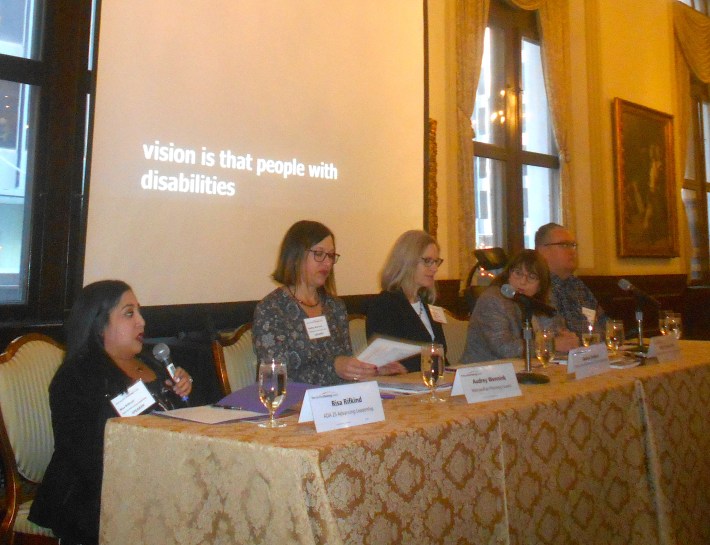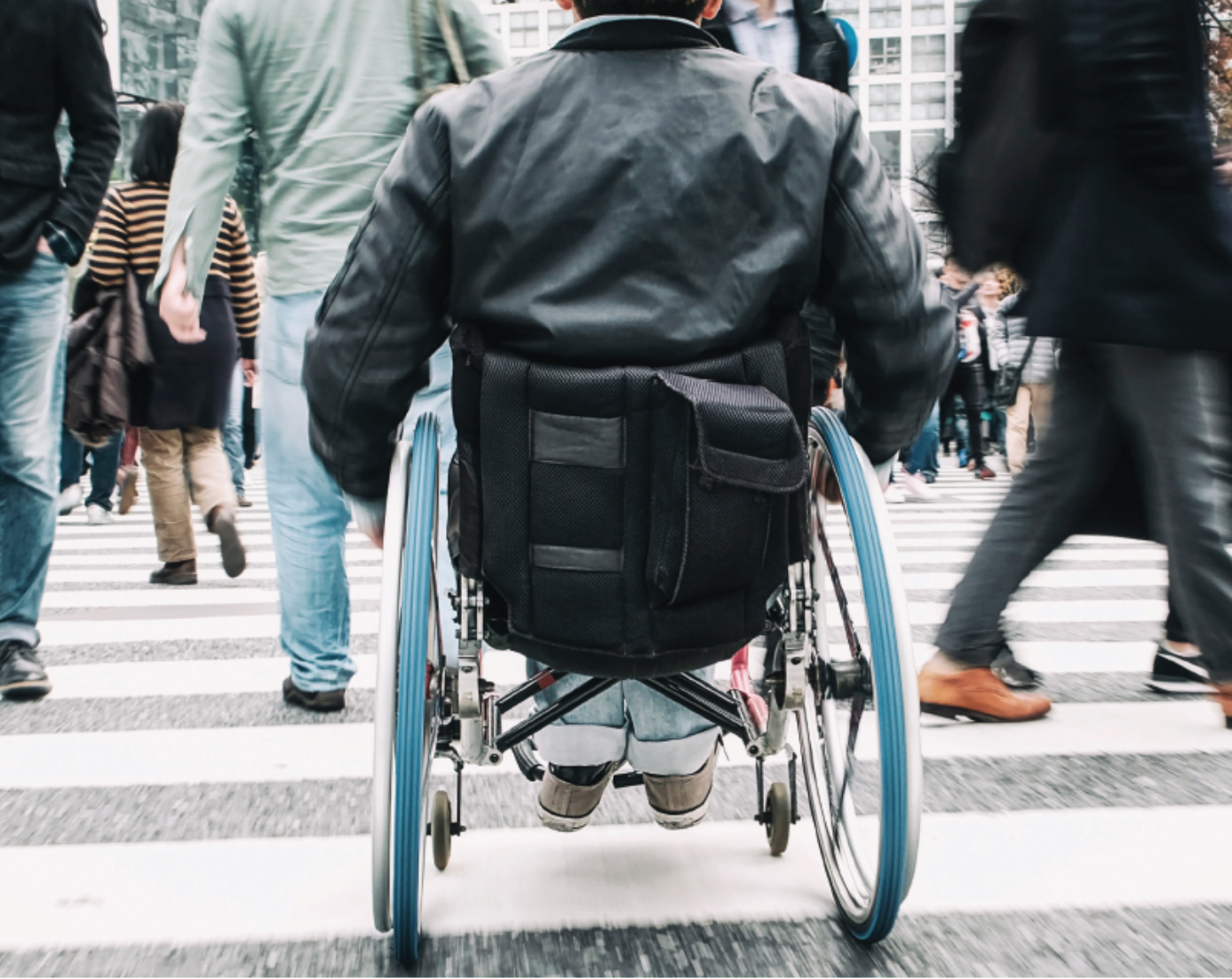
During the official release of the Toward Universal Mobility report last week at the Union League Club, transit officials and disability right activists argued that Chicago area transit providers have a long way to go to make public transportation accessible for everyone. And they said they are determined to make sure that the report's recommendations will actually become reality.
The study, which was put together by the Metropolitan Planning Council, highlighted several weaknesses in the way both local fixed-route bus networks and paratransit systems fall short. Riders face a patchwork of paratransit services, with rules and requirements that often vary between municipalities and/or providers. Many 'L' and Metra stations don't have elevators, rendering them inaccessible to people with mobility issues, and many Pace and CTA bus stops have accessibly issues as well. Technology is lagging behind, and while ride-share companies have added new mobility options, the vehicles drivers use are unlikely to be ADA-compliant.
The report laid out several recommendations on how to address those issues. Panelists at the release event emphasized that one thing all transit agencies can do better is to get disabled riders involved in the planning process from the get-go instead of scrambling to fix accessibility issues later. And the transit providers that attended the event seemed willing to do better as they try to secure the necessary funding.
In her opening remarks, MPC President MarySue Barrett said that her organization framed the issue as being less about accommodating certain types of riders and more about making sure that making the transit system equally accessible to all riders. She herself came to rely on transit more as she developed a visual disability that made it difficult for her to drive. While she already used public transit on regular bases, the change made it more essential – and made the system's shortcomings more apparent.
Audrey Wennink, MPC's director of transportation, argued that the accessibility issue affects more people than one may realize. “As MPC delved into that issue, it became clear that, based on talking to people and looking at those numbers, everybody will face disabilities, either as themselves or as caregivers,” she said. “The point here is we need to look at our transportation system much more holistically.”
Wennink also noted that, according to MPC's research, people with disabilities are more likely to face barriers to finding jobs, less likely to have full-time jobs and less likely to own cars. The limits in the transit systems make it harder for them to get jobs. “It’s a vicious cycle,” she said. “People need transportation alternatives.”
And Wennink noted that many accessibility enhancements don't just benefit disabled riders. For example, if there is no sidewalk leading to a bus stop, people in wheelchairs have a harder time getting to it – but so do parents with strollers. Likewise the elevators at 'L' and Metra stations that allow wheelchair users to access trains are also handy for parents with strollers and people carrying luggage.

Judy Shanley, Director of the Naitonal Center for Mobility Management, recalled attending a transportation meeting in rural Minnesota, where she saw that a local police chief was sitting in. When she asked why he was interested, he explained that accessibility is a public safety issue. “He said that, if people in this community don’t have transportation to have meaningful places to go [and find] job opportunities, they stay on the streets and do bad things,” Shanley recalled.
Jackie Forbes, head of the Kane County's division of transportation, made no bones about issues she faces as she tries to make local transit more accessible. Unlike McHenry County's MCRide Dial-a-Ride service, which provides rides for seniors and people with disabilities, as well as more limited service for the general public throughout most of McHenry County, Kane County doesn't have a single provider. Rather, the county funds services operated by individual governments and nonprofit organizations. This means that service can vary by township, or even the city. And, as this map illustrates, most of the western portion of the county has no service whatsoever.
When funding is available, the counties don't always use it. The report found that, while Lake and McHenry counties used all of their RTA sales tax funding for transportation-related costs, Will County used 93 percent, Kane County used 75 percent and, in a particularly striking finding, DuPage County didn't put any RTA sales tax revenue toward transportation.
To address those issues, the report proposes a number of recommendations. These includes hiring a "universal mobility coordinator" to “break down silos” between area transit providers. Wennink said that they would coordinate with federal, state and local social service agencies as well.
Other major recommendations include improving wayfinding signage, setting up alerts to let riders know if elevators and other amenities are out of order as they plan their trips, and setting up a one-stop hub for all of region's public and private transit resources. To improve the riders' travel experience, the report recommends encouraging municipalities to build accessible sidewalks and pushing transit agencies to make their facilities accessible.
Wennink said that, while the Americans with Disabilities Act requires all municipal governments to address accessibility issues, the governments with over 50 employees are also required to come up with “transition plans” to make their public faculties and roads accessible. The problem, Wennik said, is that it's not clear how many of them actually followed though, and, if so, how far along those plans are. The report calls for Chicago Metropolitan Agency for Planning to work with providers such as the Great Lakes ADA Center to develop a “tool box” to help those communities along.
Finally, the report recommends getting people with disabilities involved in the planning process. Adam Ballard, Housing and Transportation Policy Analyst at the disability rights group Access Living Chicago and a wheelchair user, emphasized that it was important to have people with disabilities involved in the planning process from the get-go.
“Where we can see the difference is those processes that included us from the very beginning work pretty well, and whose where we were consulted after the deal was done, after ink was dry, that’s where [there are problems],” he said. “We can design transportation systems that are seamless for everyone. The only thing that stops us if we don’t have the right people at the table.”
Ballard added that it's important to get riders with intellectual disabilities involved in the planning process as well. He also said that more needs to be done to ensure that caregivers who work with people with disabilities can get to their clients.
Risa Jaz Rifkind, director of engagement at ADA25 Advancing Leadership, took the point a step further, arguing that organizations should just hire more people with disabilities.
Asked what MPC planned to do to make sure the report's recommendations are followed, Wennink said that they will be working with elected officials to keep accessibility issues at the forefront. “We're serious about getting this plan implemented,” she said. “We can't do this on our own.”
Meanwhile, transit agencies are already trying to address the issues highlighted in the report. Forbes told me that Lane County is applying for an Federal Transit Administration Mobility for All grant to implement a more MCRide-style unified system.
Pace spokesperson Maggie Daly Skoggsbakken, who was one of the several Pace employees to attend the luncheon, said that her agency is very conscious of the bus stop sidewalks issue. “10 percent of our stops have missing pedestrian access,” she said, adding that Pace already has development guidelines to try to address the problem.
Daly Skoggsbakken added that Pace is using $20 million it from the Illinois capital bill to improve paratransit experience. That will be used for updates to online booking software, the phone reservation system, and automated service alerts that riders can get by text and/or e-mail, as well making it possible to use Ventra to pay for the trips. All of those features will be rolled out through 2020.
“We look forward to reading [the MPC] report in its entirety and will continue to work with our regional partners to create a transportation network that supports universal mobility,” Daly Skoggsbakken said.





